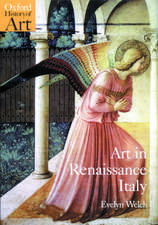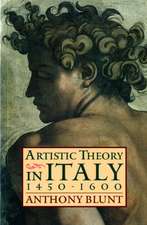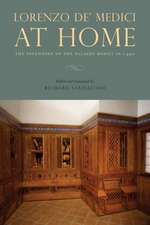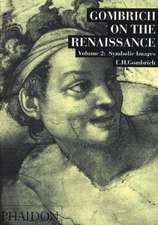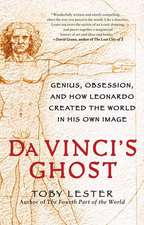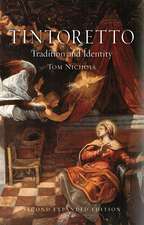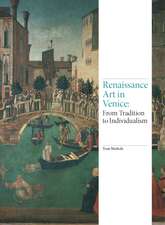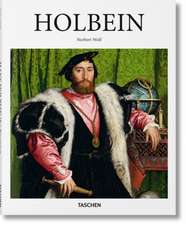Titian: And the End of the Venetian Renaissance
Autor Tom Nicholsen Limba Engleză Paperback – 15 ian 2017
Ranging widely across Titian’s long career and varied works, Titian and the End of the Venetian Renaissance outlines his radical innovations to the traditional Venetian altarpiece; his transformation of portraits into artistic creations; and his meteoric breakout from the confines of artistic culture in Venice. Nichols explores how Titian challenged the city’s communal values with his competitive professional identity, contending that his intensely personalized way of painting resulted in a departure that effectively brought an end to the Renaissance tradition of painting. Packed with 170 illustrations, this groundbreaking book will change the way people look at Titian and Venetian art history.
Preț: 232.31 lei
Preț vechi: 279.21 lei
-17% Nou
Puncte Express: 348
Preț estimativ în valută:
44.45€ • 46.41$ • 36.79£
44.45€ • 46.41$ • 36.79£
Carte disponibilă
Livrare economică 15-22 martie
Livrare express 01-07 martie pentru 99.26 lei
Preluare comenzi: 021 569.72.76
Specificații
ISBN-13: 9781780236742
ISBN-10: 1780236743
Pagini: 336
Ilustrații: 100 color plates, 70 halftones
Dimensiuni: 210 x 279 x 18 mm
Greutate: 0.97 kg
Editura: REAKTION BOOKS
Colecția Reaktion Books
ISBN-10: 1780236743
Pagini: 336
Ilustrații: 100 color plates, 70 halftones
Dimensiuni: 210 x 279 x 18 mm
Greutate: 0.97 kg
Editura: REAKTION BOOKS
Colecția Reaktion Books
Notă biografică
Tom Nichols is a reader in the history of art the University of Glasgow, Scotland, and the author of Tintoretto: Tradition and Identity, also published by Reaktion Books.
Cuprins
Introduction
Titian’s Last Painting: The Sight of Death
An Inglorious Passing; or, The Difficult Case of the Pietà
How ‘Venetian’ was Titian?
Surrogate Monuments to the Leader of a Tradition
ONE: Art as Appropriation: The Rise of Titian
Giovanni Bellini: The Model Venetian
Bellini and Titian: Master and Pupil
Titian and the Venetian Istoria
Titian and Giorgione
Giorgione and Titian’s Early Portraiture
The Early Mythologies
Titian Repaints Palma Vecchio
TWO: Remaking Tradition: Icons and Altarpieces
Anachronic Titian
The Modern Icon
The Cultural Dynamics of Space in Two Altarpieces for Venice
Private Values in a Public Picture Type
Altarpiece or Artwork?
THREE: Portraiture and Non-venezianità
Portraiture in Renaissance Venice
Titian’s Portraits to 1530: Accommodation of the Courts
Habsburg and Related Portraits of the 1530s
Historical Portraits
Natura Potentior Ars
FOUR: Sacred Painting, the Poesie and the Late Style
Titian as Tradition
Titian’s Hybrid Poesie
Two Late Mythologies
Early Responses to Titian’s Late Style
The Late Style in Critical and Historical Perspective
FIVE: Titian and Venice: Surviving the Father of Art
Patrons and Prices
Titian versus the Rest: A Literary Self-image
Pictor et eques: Titian’s Self-portraits
Images of Succession
Images of Attachment
The Darker Side of Titian; or, The Anti-image
Venetian Responses to Titian: Veronese and Tintoretto
Conclusion
Titian and the End of the Venetian Renaissance
Titian in Disguise
References
Bibliography
Acknowledgements
Photo Acknowledgements
Index
Titian’s Last Painting: The Sight of Death
An Inglorious Passing; or, The Difficult Case of the Pietà
How ‘Venetian’ was Titian?
Surrogate Monuments to the Leader of a Tradition
ONE: Art as Appropriation: The Rise of Titian
Giovanni Bellini: The Model Venetian
Bellini and Titian: Master and Pupil
Titian and the Venetian Istoria
Titian and Giorgione
Giorgione and Titian’s Early Portraiture
The Early Mythologies
Titian Repaints Palma Vecchio
TWO: Remaking Tradition: Icons and Altarpieces
Anachronic Titian
The Modern Icon
The Cultural Dynamics of Space in Two Altarpieces for Venice
Private Values in a Public Picture Type
Altarpiece or Artwork?
THREE: Portraiture and Non-venezianità
Portraiture in Renaissance Venice
Titian’s Portraits to 1530: Accommodation of the Courts
Habsburg and Related Portraits of the 1530s
Historical Portraits
Natura Potentior Ars
FOUR: Sacred Painting, the Poesie and the Late Style
Titian as Tradition
Titian’s Hybrid Poesie
Two Late Mythologies
Early Responses to Titian’s Late Style
The Late Style in Critical and Historical Perspective
FIVE: Titian and Venice: Surviving the Father of Art
Patrons and Prices
Titian versus the Rest: A Literary Self-image
Pictor et eques: Titian’s Self-portraits
Images of Succession
Images of Attachment
The Darker Side of Titian; or, The Anti-image
Venetian Responses to Titian: Veronese and Tintoretto
Conclusion
Titian and the End of the Venetian Renaissance
Titian in Disguise
References
Bibliography
Acknowledgements
Photo Acknowledgements
Index
Recenzii
“Nichols’s book offers the kind of free-flowing and deeply intelligent analysis of a painter’s career that can only be produced after long study and intimate familiarity with his subject. It is beautifully written and generously illustrated, and you feel both Nichols’s and Titian’s minds working at every turn.”
“Provocative. . . . nicely illustrated and well-produced. . . . It offers a challenging alternative view of one of the most important artists of the Italian Renaissance. Recommended.”
Descriere
This comprehensive, highly illustrated new study examines Titian's long career and varied output. Tom Nichols argues that Titian's works were self-consciously original, freely and intentionally undermining the traditional, more modest approach to painting in Venice at that time.


